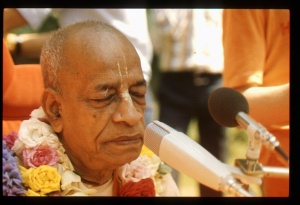CC Madhya 23.46: Difference between revisions
No edit summary |
(Vanibot #0054 edit - transform synonyms into clickable links, which search similar occurrences) |
||
| Line 17: | Line 17: | ||
<div class="synonyms"> | <div class="synonyms"> | ||
''ei pañca'' | ''[//vanipedia.org/wiki/Special:VaniSearch?s=ei&tab=syno_o&ds=1 ei] [//vanipedia.org/wiki/Special:VaniSearch?s=pañca&tab=syno_o&ds=1 pañca]'' — these five kinds of transcendental mellows; ''[//vanipedia.org/wiki/Special:VaniSearch?s=sthāyī&tab=syno_o&ds=1 sthāyī] [//vanipedia.org/wiki/Special:VaniSearch?s=bhāva&tab=syno_o&ds=1 bhāva]'' — permanent ecstatic moods; ''[//vanipedia.org/wiki/Special:VaniSearch?s=haya&tab=syno_o&ds=1 haya]'' — become; ''[//vanipedia.org/wiki/Special:VaniSearch?s=pañca&tab=syno_o&ds=1 pañca] [//vanipedia.org/wiki/Special:VaniSearch?s=rasa&tab=syno_o&ds=1 rasa]'' — five kinds of transcendental mellows; ''[//vanipedia.org/wiki/Special:VaniSearch?s=ye&tab=syno_o&ds=1 ye]-[//vanipedia.org/wiki/Special:VaniSearch?s=rase&tab=syno_o&ds=1 rase]'' — in a particular mellow; ''[//vanipedia.org/wiki/Special:VaniSearch?s=bhakta&tab=syno_o&ds=1 bhakta] [//vanipedia.org/wiki/Special:VaniSearch?s=sukhī&tab=syno_o&ds=1 sukhī]'' — a devotee becomes happy; ''[//vanipedia.org/wiki/Special:VaniSearch?s=kṛṣṇa&tab=syno_o&ds=1 kṛṣṇa]'' — Lord Kṛṣṇa; ''[//vanipedia.org/wiki/Special:VaniSearch?s=haya&tab=syno_o&ds=1 haya]'' — becomes; ''[//vanipedia.org/wiki/Special:VaniSearch?s=vaśa&tab=syno_o&ds=1 vaśa]'' — under the control. | ||
</div> | </div> | ||
Latest revision as of 22:59, 19 February 2024

A.C. Bhaktivedanta Swami Prabhupada
TEXT 46
- ei pañca sthāyī bhāva haya pañca 'rasa'
- ye-rase bhakta 'sukhī', kṛṣṇa haya 'vaśa'
SYNONYMS
ei pañca — these five kinds of transcendental mellows; sthāyī bhāva — permanent ecstatic moods; haya — become; pañca rasa — five kinds of transcendental mellows; ye-rase — in a particular mellow; bhakta sukhī — a devotee becomes happy; kṛṣṇa — Lord Kṛṣṇa; haya — becomes; vaśa — under the control.
TRANSLATION
"These five transcendental mellows exist permanently. The devotee may be attracted to one of these mellows, and thus he becomes happy. Kṛṣṇa also becomes inclined toward such a devotee and comes under his control.
PURPORT
In the Bhakti-rasāmṛta-sindhu (2.5.1), sthāyi-bhāva, permanent ecstasy, is thus described:
- aviruddhān viruddhāṁś ca bhāvān yo vaśatāṁ nayan
- su-rājeva virājeta sa sthāyī bhāva ucyate
- sthāyī bhāvo ‘tra sa proktaḥ śrī-kṛṣṇa-viṣayā ratiḥ
“These moods (bhāvas) bring under control the favorable ecstasies (such as laughing) and unfavorable ecstasies (such as anger). When these moods continue to remain as kings, they are called sthāyi-bhāva, or permanent ecstasies. Continuous ecstatic love for Kṛṣṇa is called permanent ecstasy.”